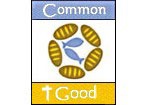How can we find happiness on earth? Thomas Storck writes that one of the first things we need is an understanding that there is no perfect communion with nature that will give us perfect happiness. The mysteries of the Rosary show us that here on earth happiness will always be tempered by some degree of suffering, as we see in the life of Christ. The path of Christ involves sorrow, but it is also the real path to joy, both in this life and the next.
Some people think that before Jesus Christ founded the Catholic church, mankind existed in a sort of happy, merry paganism, delightfully doing all those things that Catholics came along and branded as sins. The 19th century English poet Algernon Charles Swinburne, who loved to write about such pagan themes as "The laurel, the palms, and the paen, the breasts of the nymphs in the brake" also wrote the famous line, "Thou hast conquered, O pale Galilean; the world has grown gray from thy breath." Christianity had come along and cast its dreary spell over the world and the happy frolics with the nymphs in the woods were over.
Many people today think the same thing. And so if they can only get rid of their Christian attitudes, they can make this direct connection to nature and happiness and forget all the Christian notions of guilt and sin. Even some who embrace witchcraft claim to see things this way.
"To [Gerald Gardner], Witchcraft was a peaceful, happy nature religion," writes Adler of Gardner. "Witches met in covens, led by a priestess. They focused primarily on the Goddess; they celebrated the eight ancient Pagan festivals of Europe and sought to attune themselves to nature."
If only we got close to nature, maybe worshipped nature, we would be happy and free of guilt. We could be ourselves.
All that I said in my last article shows how false this view is. But now I want to focus on how the rosary also takes up these themes and shows their falsity. The first set of mysteries of the rosary is, of course, the joyful. And here, if anywhere, one could hope to find that joyous direct communion with nature and natural things that Swinburne and so many others are desperately seeking. The stories of the joyful mysteries: the angelic announcement that Mary will give birth, the visit to Elizabeth, the indescribable charm of the Nativity narrative, the presentation and the finding in the Temple. Are not most of these the stuff of Christmas cards, things that everyone can appreciate, because they are simply the joys natural to mankind, mothers, babies, animals, shepherds?
Well, yes, there is certainly this element to the joyful mysteries, but if we probe even a bit, we find that the joy is tempered by something else. In the fourth joyful mystery, Simeon says to Mary, "Behold, this child is set for the fall and rising of many in Israel, and for a sign that is spoken against, and a sword will pierce through your own soul also" (Luke 2:34-35). And shortly after the charming account of the Nativity related by St. Luke, we have another story from St. Matthew, the story of the slaughter of the innocents by King Herod. In other words, though these mysteries may be joyful, they are told against a background of evil and sorrow. That is because Jesus Christ came, even as a little babe in the cradle, to die and redeem mankind, to pay the price for our sins. Although the Christmas narratives are surely among the most delightful in the world, if we forget the dark shadow of Herod and the even darker shadow of Calvary, we do not understand them. We make of them simply cute and, ultimately, trivial stories.
This is why, then, the attempt to make a direct connection with nature and simply live happy, spontaneous lives is impossible to mankind since the Fall. Original sin has guaranteed that men will turn to evil. Indeed, ancient paganism was not chiefly revelings in the woods as Swinburne imagines, but cruelty, civil strife, conquest, slavery, and fear of dark forces. When the Catholic faith came, men saw it as the Good News, not as something that made the world grow gray. And of course, the sorrowful mysteries make all this even clearer. And it is only after the sorrow that we have the glory. Only after the final triumph of Jesus Christ will the joy of mankind be unmixed with sorrow. Until then, much of the lives of Adam's offspring will be suffering and sorrow, a valley of tears.
Because the view that somehow the Church has cast a wet blanket over mankind's pleasures is so common, it is well, when we pray the holy rosary, to sometimes focus on this specific truth: that for us in this world, joy can never be that absolute and direct communion with nature that some people think the pagans had. It is never far from sorrow. Not because God desires His people to suffer. But because the way of redemption that God offers is His own way, the following of Himself to the Cross. Only in this way can there be joy—joy here and joy in eternity.
Copyright © 2000 Thomas Storck
Thomas Storck, a convert to the Catholic faith from the Episcopal Church, is the author of The Catholic Milieu (1987), Foundations of a Catholic Political Order (1998) and the newly released Christendom and the West (2000), as well as numerous articles and reviews on the subjects of Catholic culture and social teaching. He is a contributing editor of New Oxford Review and a member of the editorial board of The Chesterton Review and has taught history at Christendom College and philosophy at Mount Aloysius College and Catonsville Community College.


